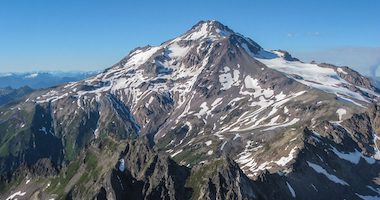Mountaineering Training | High Altitude Physiology and Climbing
Posted by: Walter Hailes
Categories: Mountaineering Fitness & Training

Adjusting to the low oxygen of high altitude environments is a natural process that we will all experience if we travel or live at high altitudes. Like all things in life, some people are better at adjusting to high altitude than others. Fortunately, there are ways that each of us can prepare at home and in the early stages of mountain travel before going to the big peaks.
We all experience the low oxygen of high altitude a little differently, but the most prominent symptoms of going to high altitude are categorized as the condition Acute Mountain Sickness (AMS). AMS is composed of a group of symptoms that can present themselves after spending some time at high altitude. Symptoms of AMS include headache, fatigue, anorexia, nausea and insomnia. While the severity of these symptoms can vary, AMS does not have to end your climb but should be used as an indication that your body is struggling to acclimatize.
The most important aspect of performing well and staying healthy in the mountains under the stress of low oxygen is by being physically fit. If you have been following a rigorous training program then you are well on your way to being physically fit for your climb. Fitness cannot prevent the symptoms of AMS but if the daily physical tasks of climbing are easier due to your high fitness level, then you have more energy reserves to battle the stress of the low oxygen environment.
Proper nutrition and hydration are also important variables leading up to and during your climb. While you may avoid simple carbohydrates during daily life, at altitude simple carbohydrates are the most efficient and most preferred form of energy for your acclimatizing body. Don’t be afraid to eat those high glycemic foods while working hard at altitude!
Dehydration can certainly be detrimental to your performance and health at high altitude, but you do not need to constantly consume water. Listen to your body, specifically your thirst, it has been finely tuned over many generations to keep you hydrated.
The prescription medication acetazolamide (Diamox) can help with acclimatization to high altitude, but it is not a magic pill that will solve all your high altitude problems. Diamox has repeatedly reduced AMS symptoms and hastened acclimatization during multi-day clinical and laboratory studies. It can work and is a great tool to use if you are not acclimatizing during an expedition even though you are using a standard acclimatization schedule, but its efficacy is less known for a quick overnight summit attempt such as Mt. Rainier. Remember: all medications have side effects that you need to understand before using and Diamox will not make up for a lack of fitness when headed into the mountains.
The bottom line is make sure that your body is fit enough to handle the stress of a high altitude mountain trip, and listen to your body while you are at altitude. If you pay attention, your body will tell you what fuel you need to keep going and how well you are adjusting to the high altitude environment. Have fun and climb safe!
_____
Walter Hailes is a senior guide at RMI and has guided extensively in North and South America. He also works as an exercise physiologist at the University of Montana, primarily studying the human capacity to endure/excel in difficult environments including high altitude, extreme heat and cold.
Questions? Comments? Share your thoughts on the RMI Blog!












Comments (2)
hey
Posted by: natalie on
It was rally useful for me. I am going to improve the level of my mountaineering with the use of this methods.
Posted by: hossein bakhtiarzadeh on